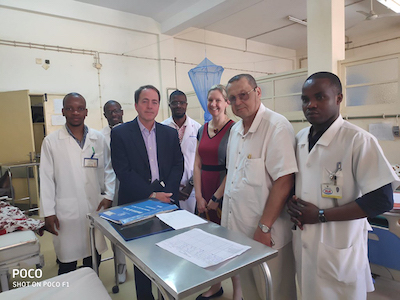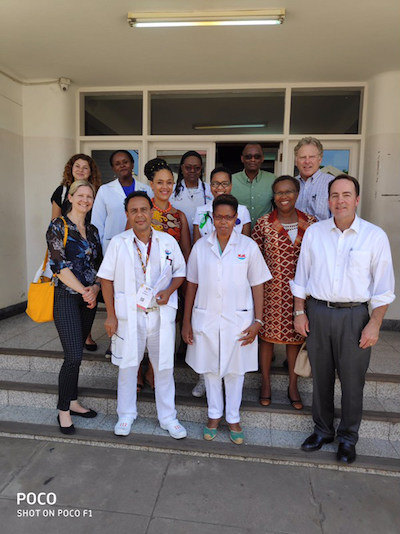Field Excursion to Mozambique: ‘The Best Version of Healthcare is Somewhere in Between’
By Tiffany Fox
If you live in the East African country of Mozambique and you get hurt or sick, you can't rely on the 911 emergency infrastructure, because there isn't one. There are no ambulances, either, and if you somehow make it to the main hospital, there is no trauma bay. Factor in a major physician shortage (estimated at one per 37,000 residents), a lack of clinical equipment and a disease burden that includes HIV, tuberculosis, malaria and advanced-stage cancers, and you have a health system that is truly struggling – but not one without hope.
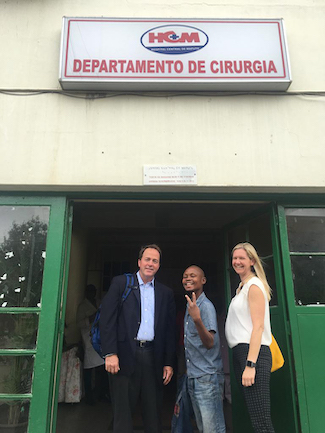 Representatives from the UC San Diego Department of Surgery, including Department Chair Bryan Clary, MD, and Assistant Clinical Professor Allison Berndtson, MD, recently spent a week collaborating with staff at the Maputo Central Hospital in Mozambique's capital to determine how UC San Diego surgeons can help surgeons in Maputo cope with an ever-increasing burden of care.
Representatives from the UC San Diego Department of Surgery, including Department Chair Bryan Clary, MD, and Assistant Clinical Professor Allison Berndtson, MD, recently spent a week collaborating with staff at the Maputo Central Hospital in Mozambique's capital to determine how UC San Diego surgeons can help surgeons in Maputo cope with an ever-increasing burden of care.
"Essentially, it was an exploratory training mission to find out what would be the best way to help the staff of the hospital," said Dr. Berndtson, who is affiliated with the Division of Trauma, Surgical Critical Care, Burns and Acute Care Surgery. "We wanted to find out what they want to get out of the partnership and how that matches up with what we can do to help. We're not trying to export our system to them – we're trying to help them learn and do research and quality improvement on their own in a sustainable way, so they can study their own system and use their resources in the way they feel is best."
Built more than 50 years ago when Mozambique was still a Portuguese colony, Maputo Central withstood 20 years of civil war and economic collapse following Mozambique's independence. The multi-block Maputo Central Hospital is the only quaternary referral hospital in the country and the only hospital to offer advanced, specialized care, including some types of uncommon diagnostic or surgical procedures. It is equipped with 1,500 beds and a staff of about 3,000, and is made up of six departments: Medicine, Surgery, Pediatrics, Orthopedics, Gynecology and Obstetrics. Residents in surgery, anesthesia and obstetrics are required to train at Maputo Central, which makes it a unique opportunity for UC San Diego physicians to reach an entirely different population of medical students.
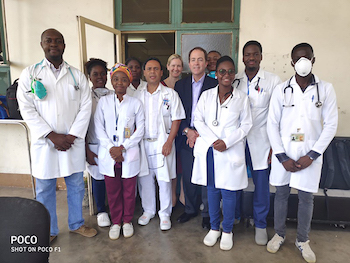 UC San Diego and Maputo Central began a collaboration 12 years ago to address the rampant spread of HIV and AIDS in Mozambique. The partnership has grown to include the entire Department of Medicine at UC San Diego. Drs. Clary and Berndtson's excursion, which took place in early November, was coordinated by the UC San Diego Departments of Surgery, Anesthesia and Obstetrics, Gynecology & Reproductive Science at UC San Diego, with the goal of advancing research, education and clinical capacity building in Maputo and Mozambique on the whole.
UC San Diego and Maputo Central began a collaboration 12 years ago to address the rampant spread of HIV and AIDS in Mozambique. The partnership has grown to include the entire Department of Medicine at UC San Diego. Drs. Clary and Berndtson's excursion, which took place in early November, was coordinated by the UC San Diego Departments of Surgery, Anesthesia and Obstetrics, Gynecology & Reproductive Science at UC San Diego, with the goal of advancing research, education and clinical capacity building in Maputo and Mozambique on the whole.
"I think we can also learn something from the way they do healthcare in Mozambique," Dr. Berndtson added. "The biggest thing we can learn is how much you really can do with limited resources. We tend to over-treat here a lot, or over-study, whether we're concerned about patients or we're worried about legal concerns. In Mozambique, they barely have any resources and are operating on esophageal cancers with nothing. The best version of healthcare is somewhere in between."
Dr. Berndtson said such field excursions can also help American physicians who are experiencing burnout by "reminding them of why they went into medicine."
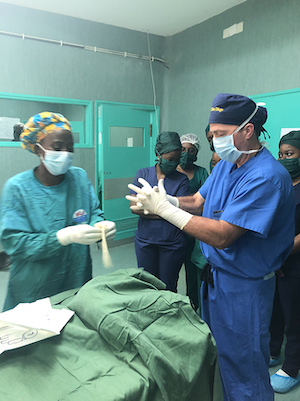 "Because the system is different there, you're more focused on taking care of the patient and less on paperwork. A trip like this can give medical residents a chance to see advanced stages of things we tend to treat early and disease processes or infections they might never see."
"Because the system is different there, you're more focused on taking care of the patient and less on paperwork. A trip like this can give medical residents a chance to see advanced stages of things we tend to treat early and disease processes or infections they might never see."
The disease burden in Mozambique also differs from that of the U.S., said Berndtson. In addition to high rates of esophageal cancer and Hepatitis B-related liver cancer, HIV and AIDS are also widespread, with more than 50 percent of patients at Maputo Central suffering from HIV/AIDS at any given time and rates of HIV-related cervical and head & neck cancer on the rise.
"When cancers do present, they tend to present very late because there is no culture of screening there, even if resources were available," added Berndtson. "The doctors provide lots of palliative procedures that aren't curative."
And that's not counting injuries from trauma. Noting that trauma kills more people worldwide than HIV, malaria and tuberculosis, Berndtson said Maputo Central also treats a lot of road injuries and burn wounds incurred through any number of realities central to life in the developing world: Cooking on open flames, bad electrical systems, lack of fire-retardant materials.
What's more, the way trauma surgery is treated is also very different at Maputo Central than the way it is typically handled in the United States, with a lot of surgeries are being done by non-surgeons and even non-physicians, Berndtson said.
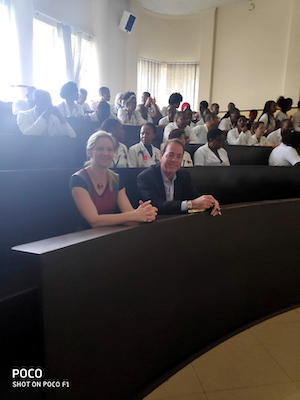 "This is because most physicians have to pick up a breadth of knowledge in order to practice as general practitioners in rural areas after leaving medical school," she explained. "They have to do basic surgery, c-sections, deliver babies. For this reason, they don't get into specialty mindset, which has pluses and minuses. The med school has a special class called 'Surgery Techs' for non-physicians who do two to three years of on-the-job surgical training in a hospital then operate independently in rural areas where no physicians are present.."
"This is because most physicians have to pick up a breadth of knowledge in order to practice as general practitioners in rural areas after leaving medical school," she explained. "They have to do basic surgery, c-sections, deliver babies. For this reason, they don't get into specialty mindset, which has pluses and minuses. The med school has a special class called 'Surgery Techs' for non-physicians who do two to three years of on-the-job surgical training in a hospital then operate independently in rural areas where no physicians are present.."
If a patient does need trauma surgery, "since there is no trauma bay in the emergency department, they have an ER area where they conduct triage," added Berndtson. "The most severe traumas are taken to resuscitation room in the ICU and worked up by anesthesiologists, whereas in the U.S., all major traumas are run by general surgeons. If the patient has life-threatening injuries, this means big delays in definitive treatments. This is something they want to change."
The timing could not be better. As Berndtson noted, the global burden of disease treatable by surgery is rising, as are injuries related to economic progress and development.
"Trauma is a rising proportion of the problem in low- and middle-income countries, partly because we're getting better at treating infectious disease. It's also because as these countries become more developed, injury rates are going to go way up. There are countries in sub-Saharan Africa where auto injuries are getting worse as more people can afford cars, roads are getting better so people are driving faster, and there is poor enforcement of traffic laws and safety measures.
"The good news in Mozambique is that from my perspective, the country is treating healthcare as a priority," added Berndtson. "People are getting taken care of even if they can't pay, and if they get referred from another clinic, they are treated for free. In a lot of countries that you go to, when patients need emergency care, they get the 'wallet biopsy' before getting taken care of. It's hard when you train in a culture like here to go to a country where someone is really sick and doesn't get taken care of."
"It's fairly obvious to me that this won't be a quick fix solution for anyone," she concluded, "but I have hope that we will make progress with this."
